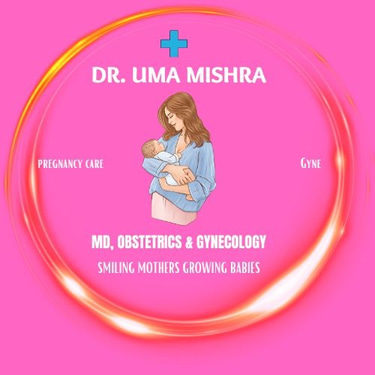Fertility concerns in women with age more than 45
Fertility concerns in women with age more than 45
Dr Uma Mishra
2/20/20244 min read


Dr Uma MIshra, MD, Gynecologist in Noida explains in detail the fertility in women after age of 45 and also describes how as a Gynecologist she can help you in getting pregnant while ensuring to track and manage the risk as per latest medical proven techniques.
Fertility After 45: Navigating the Challenges of Late Motherhood
Pregnancy after the age of 45 is a subject that has gained increased attention in recent years as societal trends and personal choices have led more women to delay childbirth. While it is indeed possible for women to conceive in their mid-40s, it is important to recognize the associated challenges and potential risks for both the mother and the baby. In this article, we will explore the factors influencing fertility in women after age 45 and discuss the medical considerations surrounding late motherhood.
Fertility Challenges:
1. Decreased Egg Quality and Quantity:
As women age, the number and quality of their eggs decline. This is primarily due to the natural aging process of the ovaries. By the age of 45, a woman's ovarian reserve – the number of eggs available for fertilization – is significantly reduced, making conception more challenging.
2. Increased Risk of Chromosomal Abnormalities:
Advanced maternal age is associated with a higher risk of chromosomal abnormalities in the developing fetus. Down syndrome, for example, becomes more prevalent as maternal age increases. Genetic counseling and prenatal testing become crucial considerations for older mothers to assess the health of the baby.
Medical Considerations:
1. Fertility Treatments:
For women over 45 experiencing difficulty conceiving naturally, assisted reproductive technologies such as in vitro fertilization (IVF) may be considered. However, the success rates of these treatments decline with age, and the potential for complications remains.
2. Prenatal Care:
Late pregnancies are categorized as high-risk, necessitating vigilant prenatal care. Regular check-ups, specialized monitoring, and additional screenings are essential to detect and address any potential complications early on.
3. Health Risks for the Mother:
Older mothers may face increased health risks during pregnancy, including gestational diabetes, hypertension, and pre-eclampsia. These conditions can pose significant threats to both maternal and fetal well-being.
4. Postpartum Considerations:
Recovery after childbirth may be more challenging for older mothers, and the risk of postpartum complications, such as hemorrhage and infections, may be higher. Adequate postpartum support and monitoring are crucial for the overall well-being of the mother.
In view of the above, Pregnancy after age 45 is indeed possible, but it comes with inherent challenges and risks. It is crucial for women considering late motherhood to be well-informed about the potential fertility issues and medical considerations involved. Consulting with healthcare professionals, undergoing thorough prenatal testing, and maintaining open communication with healthcare providers throughout the pregnancy are essential steps to ensure the best possible outcomes for both the mother and the baby. While the journey to becoming a mother after 45 may be complex, with appropriate care and support, many women can navigate this path successfully.
A gynecologist plays a crucial role in supporting women seeking to achieve pregnancy after the age of 45. Here are ways in which a gynecologist can provide assistance:
1. Fertility Assessment:
A gynecologist can conduct a comprehensive fertility assessment to evaluate a woman's reproductive health. This may include assessing ovarian function, hormonal levels, and the overall reproductive system. Understanding the specific fertility challenges a woman may face is essential in developing an effective plan.
2. Ovulation Monitoring:
Monitoring ovulation is crucial for timing conception accurately. A gynecologist can help track the menstrual cycle, identify fertile windows, and recommend methods such as ovulation predictor kits or ultrasound monitoring to optimize the chances of conception.
3. Fertility Treatments:
Gynecologists, particularly those specializing in reproductive endocrinology and infertility, can provide guidance on fertility treatments. Assisted reproductive technologies like in vitro fertilization (IVF) may be recommended to address age-related fertility challenges.
4. Hormonal Support:
Hormonal imbalances can significantly impact fertility. Gynecologists may prescribe hormonal treatments to regulate menstrual cycles, improve egg quality, and enhance the chances of successful conception.
5. Genetic Counseling:
Given the increased risk of chromosomal abnormalities in pregnancies after the age of 45, genetic counseling becomes crucial. Gynecologists can refer patients to genetic counselors to discuss potential risks and recommend appropriate prenatal testing.
6. Preconception Counseling:
Gynecologists can provide preconception counseling to ensure that women are in the best possible health before attempting to conceive. This may involve addressing lifestyle factors, optimizing nutrition, and managing any pre-existing medical conditions.
7. Prenatal Care:
If conception occurs, a gynecologist will guide the woman through a high-risk pregnancy, offering specialized prenatal care to monitor both maternal and fetal health closely. This may include more frequent ultrasounds, additional screenings, and careful management of any complications that may arise.
8. Postpartum Care:
Gynecologists continue to play a crucial role in postpartum care for older mothers. They can monitor and manage any postpartum complications, provide guidance on recovery, and address any concerns related to breastfeeding and overall maternal well-being.
9. Emotional Support:
Fertility journeys, particularly for older women, can be emotionally challenging. Gynecologists can provide emotional support, answer questions, and help women navigate the complexities of fertility treatments and late pregnancies.
It is important for women over 45 who are trying to conceive to establish a close and open relationship with their gynecologist. Regular communication, adherence to recommended treatments, and a collaborative approach between the patient and healthcare provider can significantly improve the chances of a successful and healthy pregnancy.
